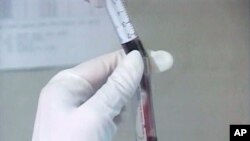Thirty years ago, medical experts reported the first cases of a mysterious and lethal new infection. The immune-system disease soon had a name, AIDS, and the virus that causes it, HIV, soon became a global scourge, killing more than two million people every year. But medical research has turned the tide against AIDS. Today, the virus is no longer a certain death sentence, and while it still kills more than a million people each year, a new generation of drugs has enabled more than 30 million people today to live with HIV.
Kathy Bennett has lived with an HIV infection for 21 years. Her outlook was bleak back in 1990, when she was first diagnosed with Acquired Immune Deficiency Syndrome and her doctor began treating her with drugs that proved too toxic. He stopped and told her to go home.
“I lay in the bed for four months waiting to die because he told me, 'I can’t treat anything,'” Bennett said.
But after she began treatments with a new class of drugs, Bennett's life changed, and now she is doing well and is a treatment counselor for AIDS patients.
“I don’t look at this virus, now that I know how to manage it, as a death sentence. I am living a normal life. I expect to be around a lot longer,” Bennett said.
Despite the availability of antiretroviral drug treatment, in 2009 about 2.6 million people were newly infected with HIV and 1.8 million people died of AIDS.
But 30 years ago, the medical community was full of pessimism. Dr. Anthony Fauci, then a physician trying to treat patients suffering with this new disease, vividly remembers those days. He is now director of National Institute of Infectious Diseases.
“We had no idea what that infectious disease was and then in a very rapid succession many, many people started getting really very sick and dying. So it was a very disturbing, dark period of time where you didn’t even know what was the cause of it,” Fauci said.
Slowly, medical experts gained a better understanding of the infection. It became clear a weakened immune system caused the condition. It also seemed to be sexually transmitted.
Dr. Robert Gallo is the co-discoverer of the Human Immunodeficiency Virus -- HIV.
“But it's not a moment - it's not a eureka - it's not like, 'Oh now I see that’s the cause of AIDS.' I tried to describe it to someone before. It's like peeling an onion -- you know you are getting step by step by step to get to the center which is, this is the cause,” Gallo said.
But there were still no drugs or vaccines to combat the virus and many experts were pessimistic. Then came a breakthrough in 1987, with the first approved drug, AZT.
"The virus could be dropped. You could measure it and see it go down. Even though the drug was toxic, the AIDS related signs and symptoms were disappearing. WOW!," Gallo said.
Hopes faded when HIV became resistant to AZT. But then, in the 1990s, effective combination drugs were developed, and they have become the most potent weapon in the effort to battle HIV.
“The 'cocktail,' as we call it, did dramatically turn around the lives of HIV infected individuals by giving them the opportunity to live essentially a normal life with good treatments,” Fauci said.
But AIDS patients say they continue to battle the social stigma attached to the disease.
“It was a lot of stigma then and it’s still lot of stigma now,” Bennett said.
Beyond treatment, the other major challenge is checking the spread of HIV. The risk of transmission remains high among people under 30. And at the Elizabeth Glaser Pediatric Aids Foundation, the focus is on protecting infants and young children from infection. Dr. R.J. Simonds, the foundation's vice president, says progress has been made, especially in developing countries.
“Mothers who were identified as being HIV-infected during their pregnancy could take a medication that could prevent their baby from becoming HIV infected,” Simonds said.
But a U.N. health report says the fight against AIDS is far from won, and the costs are unsustainable.
Next week at the United Nations, 30 heads of state will meet to review the considerable progress that's been made in combating AIDS and chart the future course of trying to treat it.











